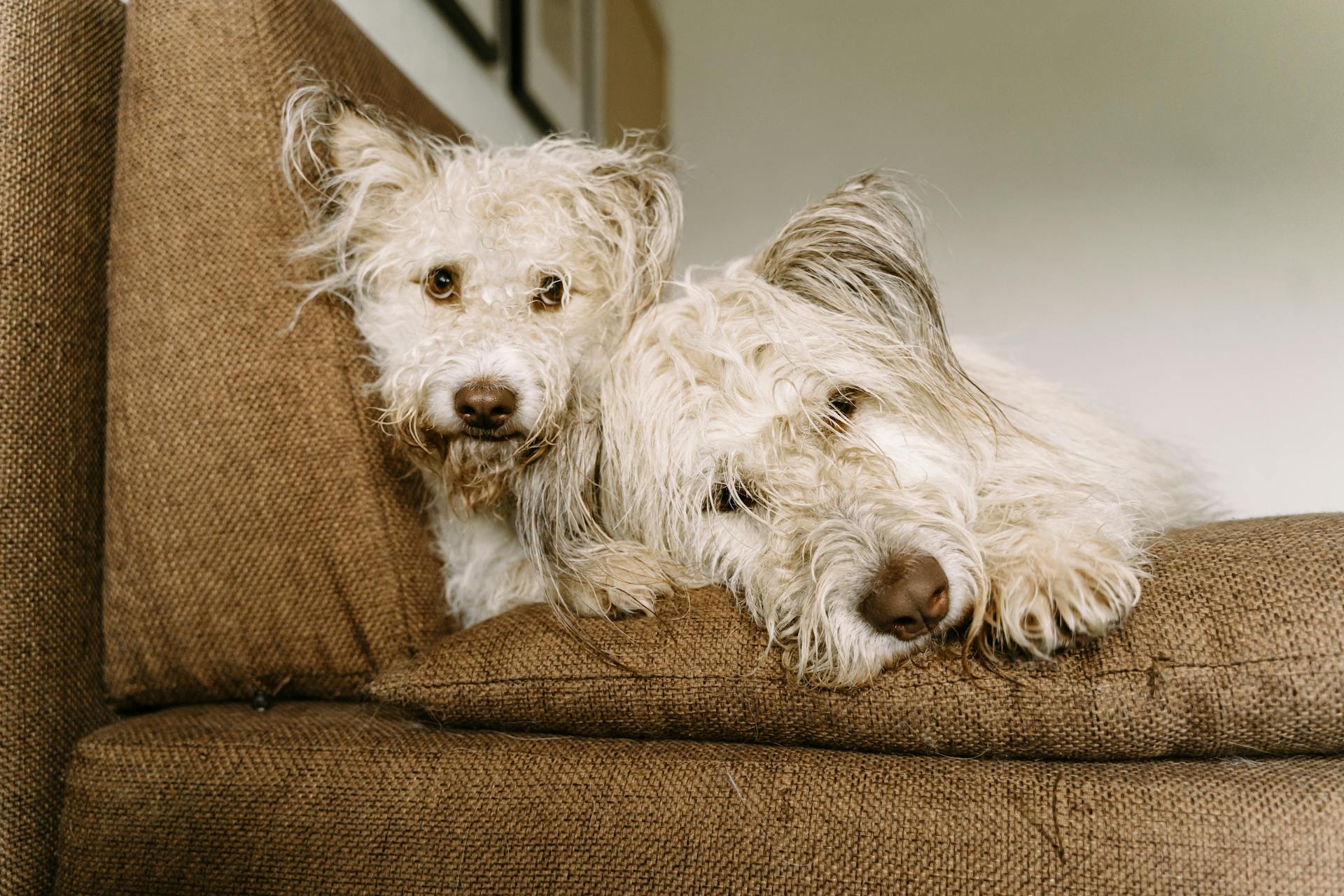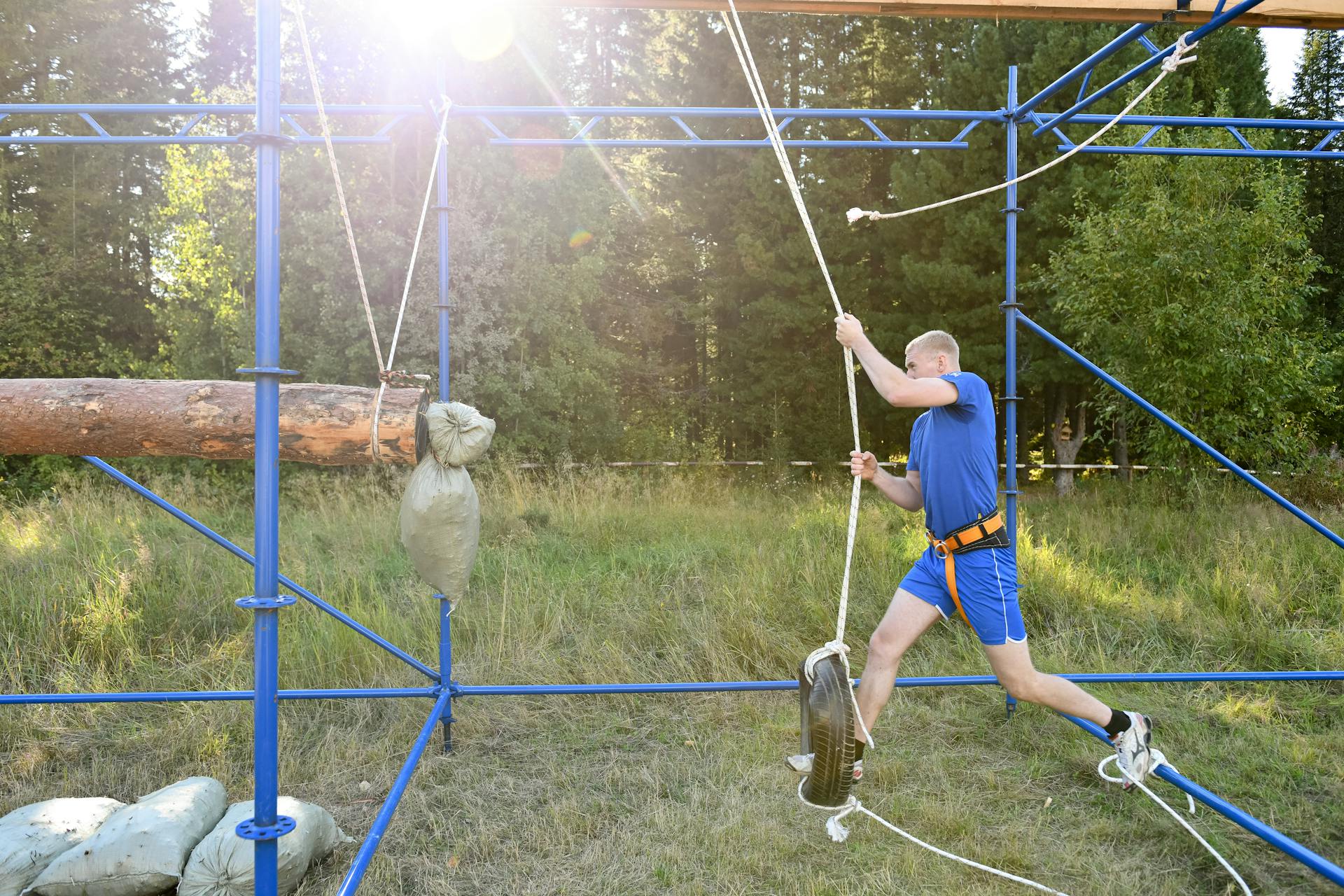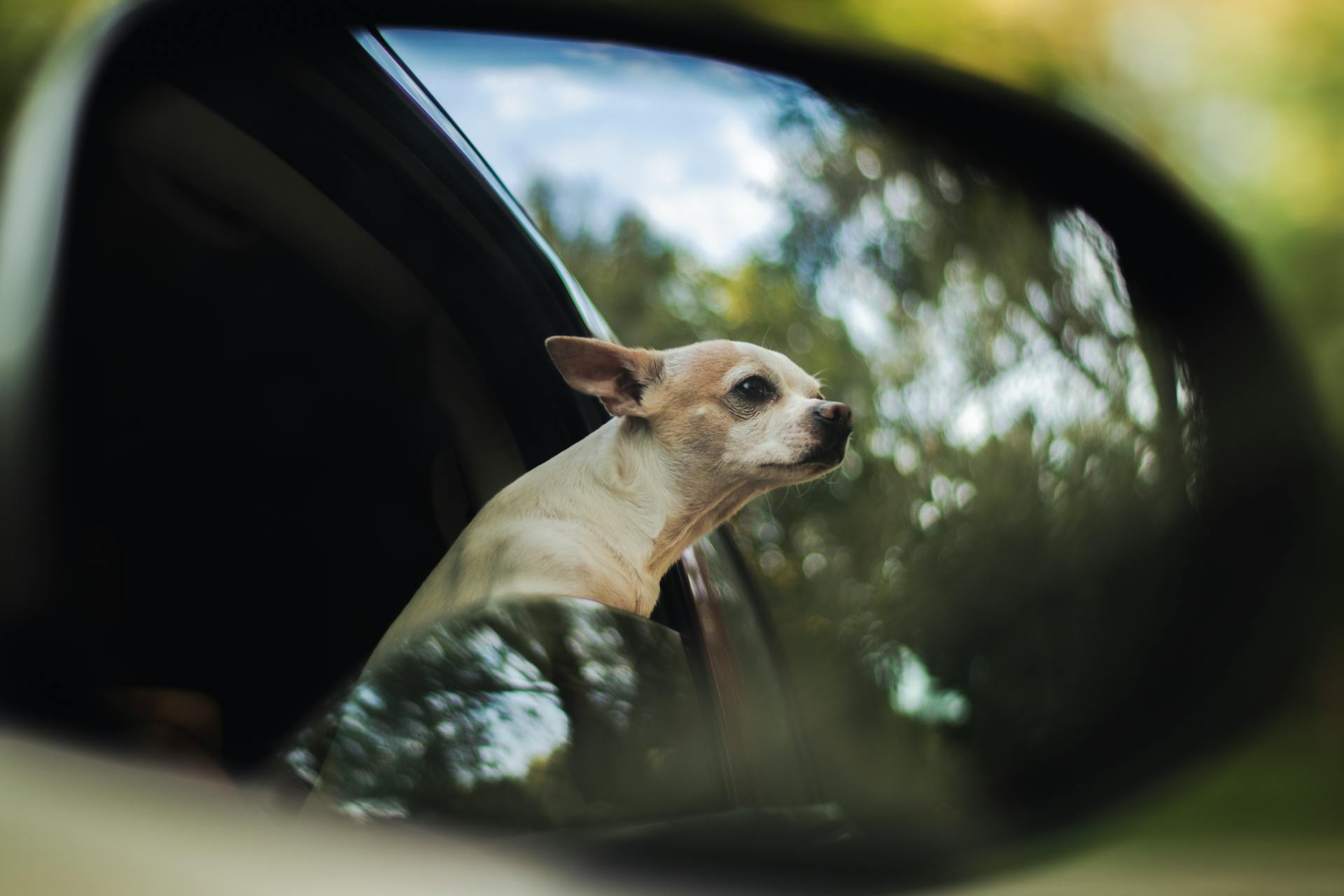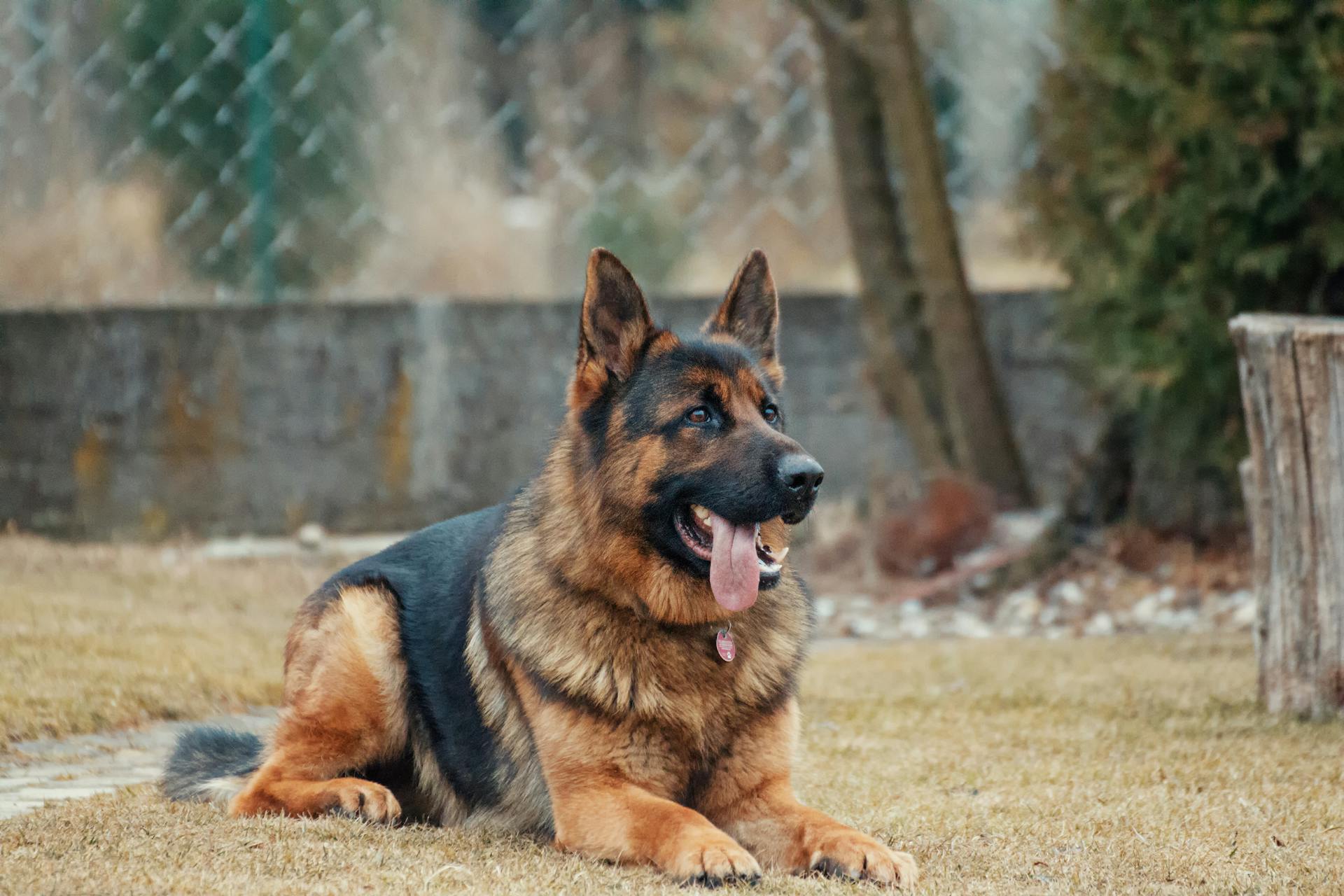
Anxiety in German Shepherd Dogs can be a real challenge for owners. They are prone to anxiety due to their high intelligence and strong herding instincts.
German Shepherds are naturally protective of their family and territory, which can sometimes manifest as anxiety or fear-based behaviors. This breed requires a lot of exercise, mental stimulation, and training to keep them calm and focused.
A lack of physical and mental stimulation can lead to destructive behaviors, such as chewing and digging, as well as excessive barking and howling. Consistency and clear boundaries are crucial in managing anxiety in German Shepherds.
With patience, understanding, and the right strategies, you can help your German Shepherd feel more secure and calm.
You might enjoy: When Do Dachshunds Calm down
Understanding Anxiety in German Shepherds
German Shepherds are prone to separation anxiety due to their strong owner bonding characteristic, which can lead to significant canine distress when you're away.
Their innate loyalty and protectiveness can make them feel anxious when you leave the house.
Recognizing the signs of separation anxiety early is key to providing the emotional support your Shepherd needs.
Destructive behavior and restlessness are common manifestations of separation anxiety in German Shepherds.
Establishing effective coping mechanisms is crucial in managing your dog's anxiety.
Early socialization, regular exercise, and creating a comfortable environment can help alleviate their distress.
Maintaining a calm demeanor during departures and arrivals can also lessen anxiety triggers.
Recognizing Symptoms
If your German Shepherd is excessively clingy when you're preparing to leave, it could be an early indicator of anxiety. They may follow you around the house, shadowing your every move, or try to block your path when you're about to leave.
Excessive whining or pacing is another common sign of separation anxiety in German Shepherds. If your dog starts whining, whimpering, or pacing nervously when they sense that you're about to leave, it's essential to take notice.
Destructive behavior, such as chewing on furniture, scratching doors or walls, or ripping apart cushions or pillows, can be a way for your German Shepherd to cope with their anxiety. This behavior can result in self-injury and damage to your property.
Suggestion: Male Dog Whining Because Female in Heat
Inappropriate elimination, such as urinating or defecating indoors, is a sign of anxiety in dogs. This behavior is not due to a lack of house training but is a result of anxiety.
Excessive salivation or drooling can be an early sign of separation anxiety in German Shepherds. If you notice that your dog's mouth is unusually wet when you're getting ready to leave, it could indicate anxiety.
Some dogs may start seeking comfort from specific objects when their owner is away. They might carry around a favorite toy or blanket as a source of security.
A table summarizing the early signs of separation anxiety in German Shepherds:
Early signs of separation anxiety in German Shepherds can vary in intensity and may not always be present in every dog. If you suspect your German Shepherd is experiencing separation anxiety, it's essential to consult with a veterinarian or a professional dog behaviorist for proper care and treatment.
Managing Anxiety
Managing anxiety in German Shepherd dogs requires a multi-faceted approach that addresses their physical and emotional needs.
Establishing a daily routine for both you and your German Shepherd is crucial in minimizing their anxiety levels. This helps them know what to expect each day and feel more secure. Consider consulting with a behaviorist to create a more stable routine for your dog.
A consistent daily routine can be boring for some, but German Shepherds love routines and daily tasks. It's essential to stick to your dog's daily schedule as much as possible, feeding, exercising, and walking them at the same time each day.
Gradually introducing your dog to alone time is a crucial step in managing separation anxiety. Start by leaving your dog alone for short periods, and gradually increase the time as they become more comfortable. This will help them understand that being alone isn't a bad thing.
To alleviate anxiety, create a comfortable environment for your dog. Provide a quiet room with cozy bedding and familiar scents, helping your dog feel secure when alone. Mental stimulation is also a great preventative measure, leave interesting toys and puzzles to keep your dog occupied.
For your interest: Canine Lymphoma Awareness Day
Regular exercise can help reduce anxiety levels in German Shepherds. Aim for a good walk or play session before leaving your dog alone. You can also use crate training to help your dog feel more comfortable when left alone. Crate training can be a safe and secure space for your dog while you're away, minimizing their separation anxiety.
Here are some effective training techniques for anxiety:
- Behavior modification, particularly counterconditioning and desensitization, to gradually expose your dog to their anxiety triggers.
- Positive reinforcement to reward your dog's calm behavior and gradual acceptance of being alone.
- Relaxation techniques, such as teaching your dog commands that promote calmness, like 'sit' or 'stay.'
Remember, patience and consistency are key when training your German Shepherd to manage anxiety. Monitor your dog's training progress and adjust your methods as necessary. If you feel overwhelmed, don't hesitate to seek professional guidance from a trainer or behaviorist.
Treatment and Training
Crate training is a great way to help your German Shepherd feel more comfortable when left alone, especially if started from a young age. The crate becomes a safe place for your dog, associated with feelings of security.
Desensitization and counter-conditioning can also help overcome some forms of anxiety in German Shepherds. This involves exposing your dog to anxiety triggers in a non-threatening manner, gradually increasing the duration and intensity.
A unique perspective: Healthy Mind Canine - Separation Anxiety Training
Positive reinforcement is another vital technique, rewarding your dog's calm behavior with treats, praise, or toys. This encourages them to repeat the behavior, building confidence over time.
Behavior modification is key in managing separation anxiety, helping your dog associate anxiety triggers with positive experiences rather than stress. You can start by identifying triggers, then gradually exposing your dog to these stimuli under controlled circumstances.
Exercise and physical activity can also help reduce anxiety levels in German Shepherds. A tired dog is a good dog, and regular exercise is a natural stress reliever.
Check this out: Dog Training Positive Reinforcement
Addressing Through Training
Addressing separation anxiety in German Shepherds through training is a crucial step in helping them live a happy life free of stress. It takes time and patience, but the results are well worth it.
Behavioral modification is key to managing separation anxiety. This involves identifying your dog's anxiety triggers and gradually exposing them to these stimuli under controlled, non-threatening circumstances.
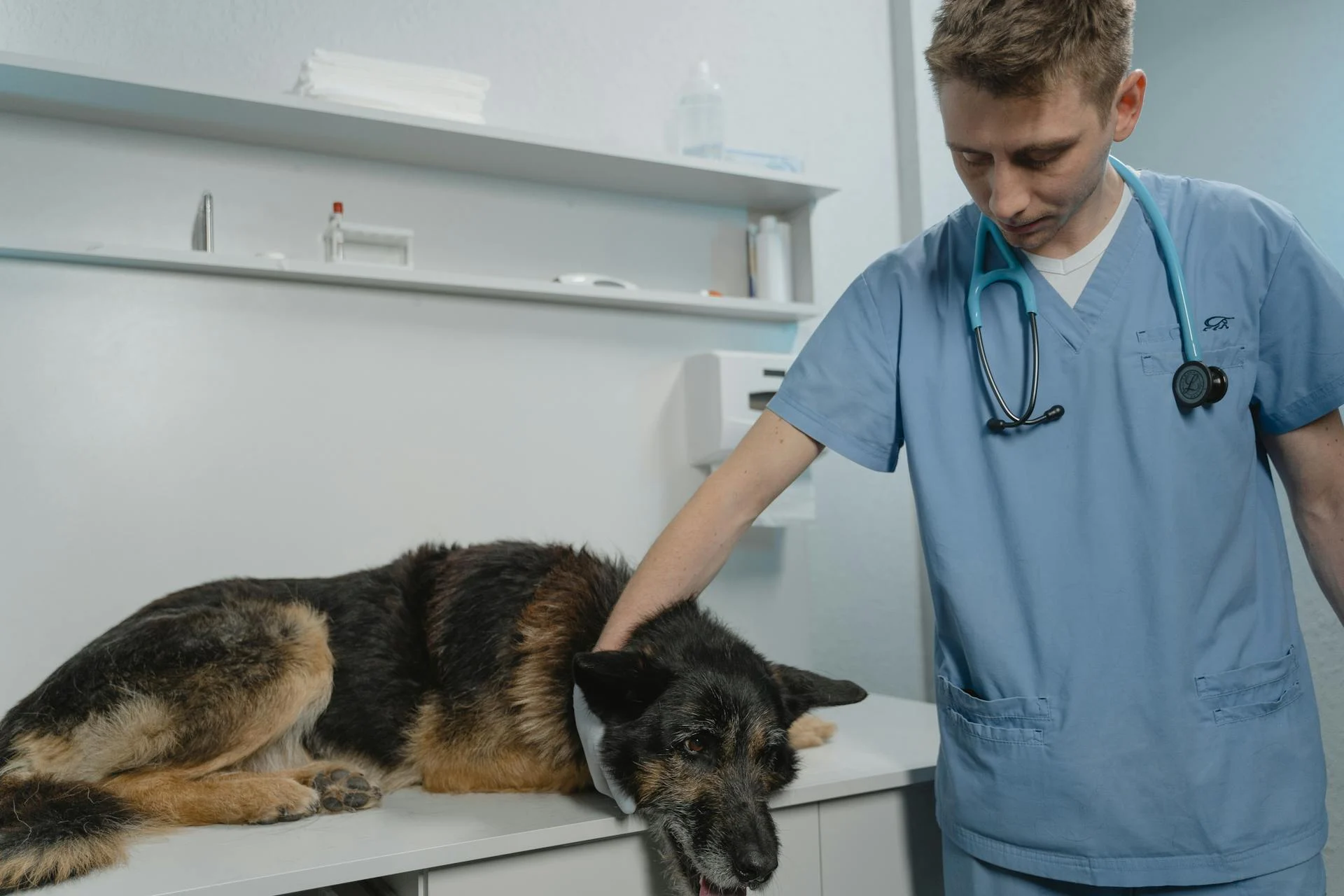
Desensitization and counter-conditioning are effective techniques for reducing anxiety. By associating anxiety triggers with positive experiences, your dog will learn to manage their stress.
Positive reinforcement is another vital technique. Reward your dog's calm behavior with treats, praise, or toys to encourage them to repeat the behavior.
Some effective training methods include:
- Behavior modification, particularly counterconditioning and desensitization
- Positive reinforcement, such as rewarding calm behavior with treats and praise
- Relaxation techniques, such as teaching your dog commands that promote calmness
- Regular exercise, which acts as a natural stress reliever
A tired dog is a good dog, and physical activity is a natural stress reliever. Make sure to provide ample exercise before departure to help lower anxiety levels.
Monitoring your dog's training progress is essential. Note any behavioral challenges that arise and adjust your training methods as necessary. Patience and consistency are key, and the speed of progress can vary greatly between dogs.
Medications and Supplements
If your German Shepherd's separation anxiety is severe, you may need to consult with a professional to help you manage your condition.
A vet might prescribe supplements or medication to help lessen anxiety.
Medications can include daily anxiety medications or short-acting tranquilizers, depending on the situation.
Check this out: Skin Relief for Dogs with Allergies
Some veterinarians advise using drugs like alprazolam, which is recommended for anxiety and panic disorders, or amitriptyline, which is used to treat depression.
One of the most popular natural supplements for separation anxiety in dogs is CBD oil.
Increased serotonin levels from the oil may help German Shepherds unwind and feel more certain that they won't be abandoned.
Don't make alone decisions for medical treatment, talk to your veterinarian about the best course of treatment for your German Shepherd's separation anxiety.
Health and Wellness
As your German Shepherd ages, its health needs will change. It's essential to recognize the physical health issues that will occur and know how to care for your ageing German Shepherd.
Preventing anxiety is better than trying to cure it, so identify sources of anxiety and take steps to prevent or alleviate the stressors. This can be achieved by increasing exercise and mental stimulation.
If your dog is exhibiting signs of anxiety and you've tried increasing exercise and mental stimulation, it's a good idea to consult a vet. They can rule out possible illnesses, prescribe medication, and refer you to a trained animal behaviorist for further training if needed.
A fresh viewpoint: Does Neutering Help Dog Aggression
Establish a Daily Routine
Establishing a daily routine is crucial for your German Shepherd's mental health. This will help them feel more secure and know what to expect each day.
A daily routine will also give you and your pup a sense of structure and stability. German Shepherds thrive on a consistent routine, so don't worry if you think it's boring for them.
Consistency is key, so try to feed, exercise, and walk your German Shepherd at the same time each day. This will help them adjust to your schedule and reduce anxiety.
Make sure to stick to your routine even on weekends or days off. German Shepherds love routines and daily tasks, so they'll appreciate the predictability.
If you need to make changes to your routine, try to keep it consistent for a while before making another adjustment. This will help your German Shepherd adjust to the new schedule.
A tired dog is less likely to develop separation anxiety, so make sure to give your German Shepherd plenty of exercise before you leave the house. A long walk or run will help reduce their stress levels and keep them happy and well-adjusted.
Consider reading: Why Are Dachshunds so Stubborn
Health
As your furry friend ages, it's essential to recognize the physical health issues that will occur. German Shepherds, for example, will experience health changes as they age.
German Shepherds need regular care and attention, especially as they age. This includes keeping track of their health, grooming, and care.
Some dog breeds are more prone to anxiety than others. Companion breeds like German Shepherds, which need attention from their owners, are more likely to suffer from separation anxiety.
If your dog is exhibiting signs of anxiety, don't hesitate to consult a vet. They can rule out possible illnesses, prescribe medication, and refer you to a trained animal behaviorist for further training if needed.
Explore further: German Breeds of Dogs
Prevention and Care
Prevention and care are key to managing anxiety in German Shepherd dogs. Early socialization and training are vital in raising a well-adjusted German Shepherd, significantly reducing the chances of separation anxiety and other behavioral issues.
Identifying sources of anxiety and taking steps to prevent or alleviate the stressors is crucial. By understanding what triggers anxiety in your dog, you can take proactive measures to minimize its impact.
Confidence building through socialization and training is essential. Socialization not only helps your pet become more adaptable and confident but also prevents the onset of fear-based behaviors.
Mental stimulation is just as important as physical exercise for your German Shepherd. Engaging training exercises prevent boredom and keep your puppy's mind sharp.
Regular training sessions serve as bonding activities, strengthening your relationship and trust with your dog. This bond is crucial in alleviating separation anxiety, as your pet learns to trust in your return.
Here are some ways to boost your German Shepherd's confidence and mental stimulation:
- Confidence building: Socialization and training boost your puppy’s confidence, enabling them to interact positively with their surroundings.
- Mental stimulation: Engaging training exercises prevent boredom and keep your puppy’s mind sharp.
- Bonding activities: Training provides opportunities for quality time, enhancing trust between you and your pet.
By following these prevention and care tips, you can help your German Shepherd dog live a happy and anxiety-free life.
Sources
- https://gsdcolony.com/blogs/news/german-shepherd-separation-anxiety
- https://mybravepaws.com/blogs/dog/german-shepherd-anxiety
- https://www.pethooligans.com/german-shepherd-separation-anxiety/
- https://www.dogster.com/dog-health-care/anxiety-in-dogs
- https://pureblackgsdlife.com/german-shepherd-separation-anxiety-coping-strategies/
Featured Images: pexels.com
